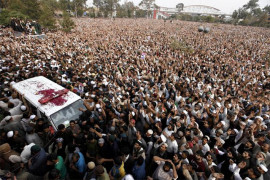
Death penalty worldwide
Every year, the US takes a spot behind China, Iran, Iraq and Saudi Arabia for the most executions. Pakistan quickly climbed the ladder after it ended a seven-year moratorium on death penalty in December 2014. Before Pakistan lifted the moratorium, 22 countries executed 2,466 people in 2014, a 28% increase from the previous year. More than 300 people were hanged on judicial orders in Pakistan last year.
Mumtaz Qadri: From Ghazi to Shaheed
The reasoning and methods of execution vary around the world. Australia (including New Zealand) is the only continent observing moratorium on death penalty while Belarus is the only exception in Europe that continues to carry out capital punishment. Religion, geography and culture are no barriers to the centuries-old practice. For example, the rate of execution has been on the rise in otherwise pacifist and developed Japan.
According to the United Nations, 60 other countries fall in the category of ‘de facto abolitionists’, meaning that they have not revised their laws permitting death penalty but no more carry it out. Today, 28 countries mete out death sentences while 105 are committed to its cessation.
Is it a proper punishment?
Though involvement in terrorism is publically seen as a crime worthy of death penalty, the question remains as to how far capital punishment would make society more secure. As far as public opinion goes in Pakistan, Gilani Research Foundation survey carried out by Gallup Pakistan released last month found 92% Pakistanis support death penalty for terrorists. The nationally representative survey was carried out among a sample of 1,826 men and women in rural and urban areas of all four provinces of the country. Moreover, according to Amnesty International, Pakistan has more than 8,000 prisoners on death row, majority of whom have exhausted the appeals process.
Supporters of capital punishment rely on general deterrence theory, which supposes that increasing the risk of punishment for crime deters individuals from committing it. Nobel laureate Gary S Becker's seminal 1968 study of the economics of crime exposed the costs and benefits of committing crime. The deterrence theory contends that criminals are no different from law-abiding people. They too want to maximise their own self-interest in relation to constraints. Various studies in the US, where public support for capital punishment is high like Pakistan, demonstrate that death penalty saves lives.
The most incisive commentary on Mumtaz Qadri’s execution
Professors Hashem Dezhbakhsh, Paul R Rubin and Joanna M Shepherd of Emory University discovered that each execution, on average, results in 18 fewer murders. The trio relied on data set of over 3,000 counties in the US from 1977 to 1996. Another study found that one death sentence saves 14 lives. However, the deterrent effect is directly proportional to the wait before the execution. The longer the wait, the lesser the deterrent effect!
Pro-life activists believe that no conclusive evidence exists that death penalty deters crime more effectively than a prison term. They argue that countries with no death penalty have lower crime figures if not considerably reduced. There is a unique example of Canada where murder rate in 2008 was less than half of what it used to be in 1976 when the death penalty existed.
Life and death matters
Critics believe the legal system is unjust, with rampant police torture, poor representation for victims and unfair trials. In the case of Pakistan, much of the argument stands ground. In the case of Qadri, there was no such impediment at all.
Human rights organisations believe that the death penalty is discriminatory, used mostly against the most vulnerable in society, such as the poor, ethnic and religious minorities. There is no room for undoing the mistake in justice after capital punishment is executed. Death can’t be reversed.
The threat of execution for politically or religiously motivated people is not a deterrent. Those who are prepared to die for their belief only romanticise death in such a manner. The massive funeral procession of Mumtaz Qadri can be a case in point.
Did Governor Taseer himself favour capital punishment? He was known to be a humanist, who would have advised otherwise. Perhaps Sheheryar Taseer pointed to the same when he tweeted: “Mumtaz Qadri being hanged is a victory to Pakistan. Not the Taseer family. The safe return of my brother is the only victory my family wants.”
Ironically, the progressives in Pakistan reacted differently to the most recent death sentence. Some are seen supporting capital punishment for terrorists while others want its blanket abolishment.
Security upped for president ahead of Mumtaz Qadri’s mercy plea decision
Pakistani society needs time to agree against capital punishment. Meanwhile, the state and the civil society may pay attention to the appalling condition of prisons which act as nurseries for criminals. If anything, Pakistan needs an effective prisoner rehabilitation programme as part of its anti-crime and counter-terror strategy.
Naveed Ahmad is a Pakistani investigative journalist and academic with extensive reporting experience in the Middle East and North Africa. He is based in Doha and Istanbul. He tweets @naveed360










































COMMENTS (6)
Comments are moderated and generally will be posted if they are on-topic and not abusive.
For more information, please see our Comments FAQ